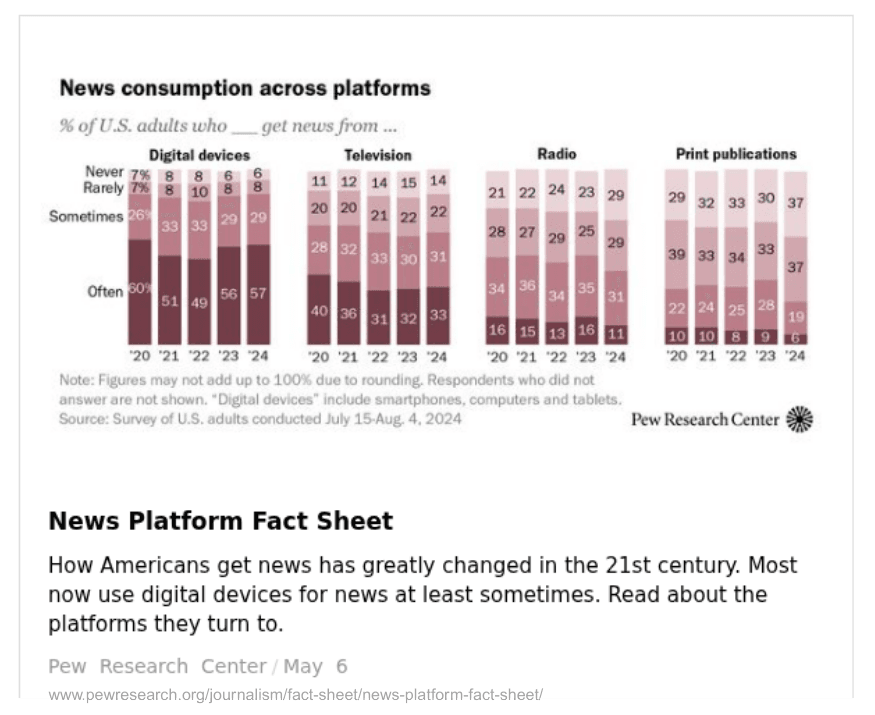This morning, as I drank my coffee, I read Dan Rather’s article “Got a Spare Billion?” Last week, Congress passed what Rather calls “the least popular piece of legislation in modern polling history.” Despite strong opposition, the bill passed by a narrow margin. He explains, “It cuts Medicaid for millions, strips food assistance from children, gives tax breaks to the ultra-wealthy, and adds to the federal deficit.”
Given this, you might wonder: how did such an unpopular bill become law?
Rather argues the answer lies in the kind of information Americans receive—or don’t receive.
Currently, we face a constant challenge in reaching voters who are disengaged or uninformed. As politics becomes more divisive, toxic, and downright cruel, it’s getting harder to connect with people. Consequently, many are tuning out completely—and honestly, who can blame them?
To better understand what influences people today, it’s important to consider how they get their information. The News Platform Fact Sheet from the Pew Research Center shows that the way people get their news has changed dramatically in recent years.

Alternative News Sources
As trust in mainstream news has dropped sharply, more people are turning to online “influencers” for information. However, many of these influencers don’t have any background in journalism or education in the fields they discuss. Instead, some are comedians or longtime YouTube personalities known for prank videos. Because they talk about politics and world events from a regular person’s point of view, their audiences find them relatable.
Additionally, these influencers often discuss issues out of curiosity and a desire to understand. Yet, they usually do little research and rely heavily on what other influencers say. As a result, misinformation spreads easily and gets repeated so often that it eventually becomes accepted as fact. This trend is further fueled by a deep distrust of the government and experts, who are frequently dismissed as part of the “deep state”, facts and data matter less than the overall vibe or feeling people get from the conversation.
So, how can we push back against this trend?
Over the past 30 to 40 years, Republicans and their allies have built a huge media ecosystem, yet Democrats don’t have anything similar. As a result, it feels like we’re fighting a modern battle with outdated tools. While there’s been a lot of talk about how Democrats need their own “Joe Rogan of the left”, the people running Democratic efforts often aren’t in touch with everyday people. Instead, they’re spending a lot of money trying to copy what the right has built, but it often comes off as fake and forced. Ultimately, real progress has to come from voices who already have people’s attention and trust, and it needs to grow naturally, not just from top-down efforts.
What Can We Do in Volusia County?
A first step is to connect with our communities and genuinely listen. Some people are reflecting on their voting choices and what those decisions have meant for them, some are actual targets of the current administration. Rather than telling them what you think is best for them or criticizing how they voted, try to offer understanding and create a space where they can process their experiences and let go of some of their past beliefs. Furthermore, look for ways to build real relationships where you can become a reliable source of information. Over time, you can become someone people trust and turn to for guidance.
Ways to Counter Misinformation Locally
- Build Trusted Local Networks: Work with faith leaders, educators, and community organizers to share accurate information.
- Facilitate Open Dialogue: Host town halls or forums where people can ask questions and discuss concerns in a respectful environment. It can even be as simple as having regular get togethers at someone’s house with neighbors.
- Collaborate with Local Organizations: Partner with schools, libraries, and local media to spread accurate information.
- Civic Engagement: Attend or watch County and City government meetings.
Participate in subjects that matter to you. Let others in your community see that you are an advocate for what matters to them too. - Letters to the Editor: A great way to counter misinformation is regular Letters to the Editor to debunk harmful narratives.
- Pre-bunk and Debunk: Warn people about common misinformation before they encounter it, and correct false information quickly.
- Promote Media Literacy: Organize workshops to help people spot misinformation and recognize bias.
- Support Local Journalism: Encourage your community to read and support local independent journalism.
- Write a blog: If you have areas of knowledge you are passionate about, start writing it down. You might be surprised that people want to read what you have to say.
Have you done any of these? Tell us about it in the comments below!
In solidarity,
Charleen




Thank you for this article. WE are the grassroots efforts and we have work to do. It doesn’t have to be overwhelming.
Yes exactly! Everyone can do one thing they are good at and it all adds up. WE are the party and can make change happen together 💙